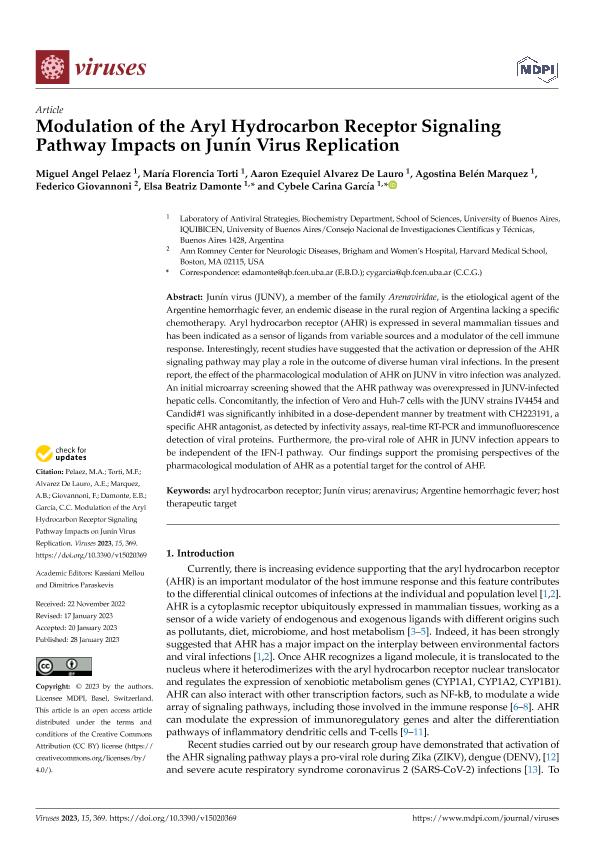Artículo
Modulation of the Aryl Hydrocarbon Receptor Signaling Pathway Impacts on Junín Virus Replication
Peláez, Miguel Ángel; Torti, Maria Florencia ; Alvarez de Lauro, Aaron Ezequiel
; Alvarez de Lauro, Aaron Ezequiel ; Marquez, Agostina Belén
; Marquez, Agostina Belén ; Giovannoni, Federico
; Giovannoni, Federico ; Damonte, Elsa Beatriz
; Damonte, Elsa Beatriz ; Garcia, Cybele
; Garcia, Cybele
 ; Alvarez de Lauro, Aaron Ezequiel
; Alvarez de Lauro, Aaron Ezequiel ; Marquez, Agostina Belén
; Marquez, Agostina Belén ; Giovannoni, Federico
; Giovannoni, Federico ; Damonte, Elsa Beatriz
; Damonte, Elsa Beatriz ; Garcia, Cybele
; Garcia, Cybele
Fecha de publicación:
02/2023
Editorial:
MDPI
Revista:
Viruses
ISSN:
1999-4915
Idioma:
Inglés
Tipo de recurso:
Artículo publicado
Clasificación temática:
Resumen
Junín virus (JUNV), a member of the family Arenaviridae, is the etiological agent of the Argentine hemorrhagic fever, an endemic disease in the rural region of Argentina lacking a specific chemotherapy. Aryl hydrocarbon receptor (AHR) is expressed in several mammalian tissues and has been indicated as a sensor of ligands from variable sources and a modulator of the cell immune response. Interestingly, recent studies have suggested that the activation or depression of the AHR signaling pathway may play a role in the outcome of diverse human viral infections. In the present report, the effect of the pharmacological modulation of AHR on JUNV in vitro infection was analyzed. An initial microarray screening showed that the AHR pathway was overexpressed in JUNV-infected hepatic cells. Concomitantly, the infection of Vero and Huh-7 cells with the JUNV strains IV4454 and Candid#1 was significantly inhibited in a dose-dependent manner by treatment with CH223191, a specific AHR antagonist, as detected by infectivity assays, real-time RT-PCR and immunofluorescence detection of viral proteins. Furthermore, the pro-viral role of AHR in JUNV infection appears to be independent of the IFN-I pathway. Our findings support the promising perspectives of the pharmacological modulation of AHR as a potential target for the control of AHF.
Archivos asociados
Licencia
Identificadores
Colecciones
Articulos(IQUIBICEN)
Articulos de INSTITUTO DE QUIMICA BIOLOGICA DE LA FACULTAD DE CS. EXACTAS Y NATURALES
Articulos de INSTITUTO DE QUIMICA BIOLOGICA DE LA FACULTAD DE CS. EXACTAS Y NATURALES
Citación
Peláez, Miguel Ángel; Torti, Maria Florencia; Alvarez de Lauro, Aaron Ezequiel; Marquez, Agostina Belén; Giovannoni, Federico; et al.; Modulation of the Aryl Hydrocarbon Receptor Signaling Pathway Impacts on Junín Virus Replication; MDPI; Viruses; 15; 2; 2-2023; 1-14
Compartir
Altmétricas



